
Echo
Blockchain ecosystem with DeFi-styled bridges
- Blockchain
- Web
- Mobile
- Cryptocurrency
- Smart Contracts
- DApps

- Blockchain
- Web
- Mobile
- Cryptocurrency
- Smart Contracts
- DApps
High-end network for building smart contracts and decentralized applications with EVM support, fast finality consensus mechanism, and inter-blockchain communication protocol.
Echo’s goals
Web3
Set up a convenient environment consisting of customary tools and web3 support that will allow developers to build next-generation dApps
Decentralization
Establish a high level of decentralization while maintaining blazing fast transaction processing speed
DeFi
Introduce a fully-fledged and open-source ecosystem of services for the FinTech industry
Governance
Empower users to freely and securely carry out transactions and become members of a global community
Sidechain
Ensure top interoperability among different chains and allow for the smooth exchange of assets and data
ZK rollup
Tackle Ethereum’s scalability issues with the help of ZK rollup and interchain connection
Layer2
Provide Bitcoin with more DeFi flexibility options
KYC
Guarantee greater data safety via the decentralized identity (DID) mechanism
Work done
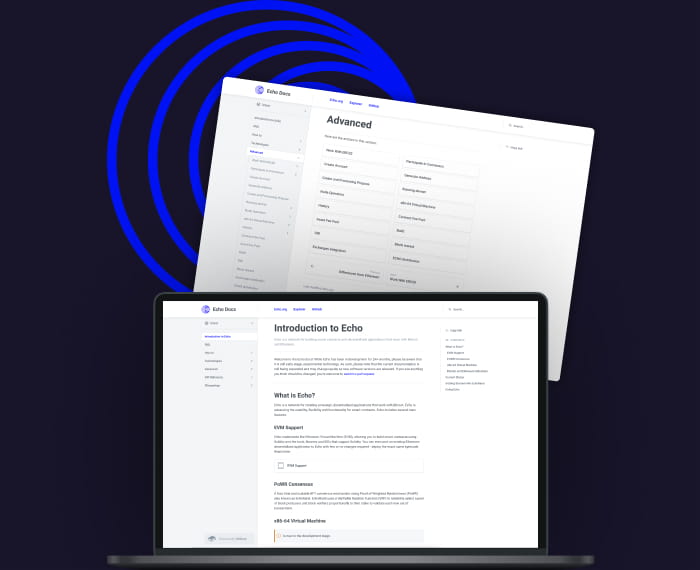
Echo blockchain
Echo explorer
Providing data about current state and transaction history via graphs, charts, and tables
EchoDB
Special service offering public API for Echo data
Echo Committee Dashboard
Displaying relevant and updated statistics
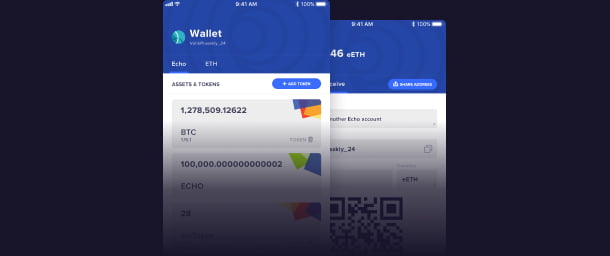
Mobile wallet
iOS and Android multi-currency wallets which provide support for multisignature, BTC and ETH networks and sidechains, ERC20, BLE payments, and TOR connection with network nodes
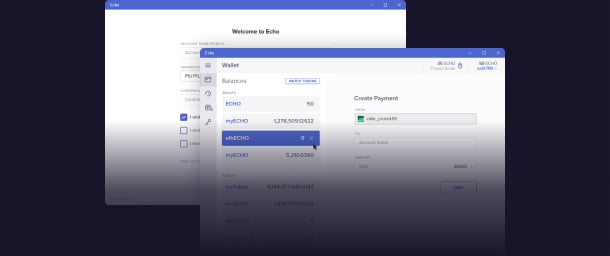
Desktop wallet
Echo wallet for PC, Mac, and Linux allowing users to create, manage, and import an Echo account, effectively work with contract, and support a full node to make staking effortless

Bridge
Metamask-like browser extension for Echo empowering users to easily access and manage their Echo account data within the web-browser
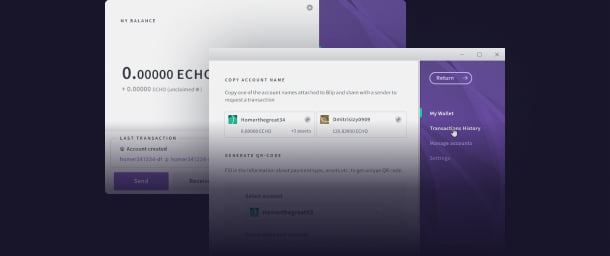
Blip
Multi-currency desktop wallet with multiple account management and local key storage
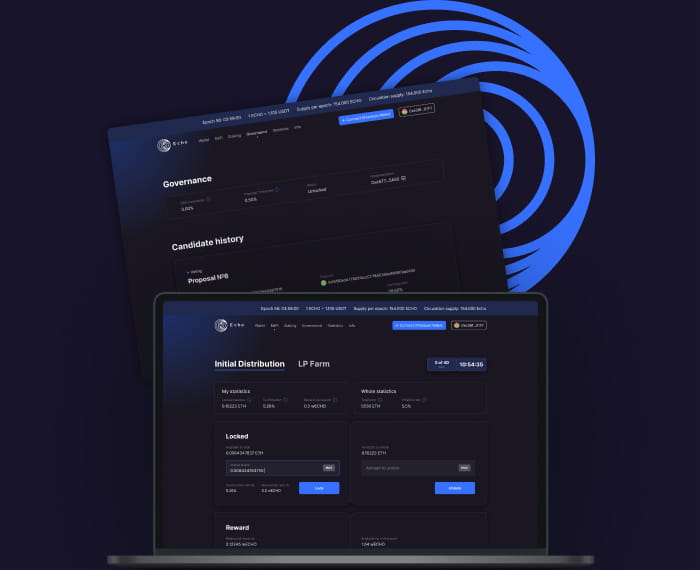
Echo studio
Remix-based IDE for Echo smart contracts
JS lib
Javascript Echo library for node.js and browsers
Echo Mobile Frameworks
Allowing mobile platforms to swimmingly interact with the Echo blockchain
Echo SDK
State-of-the-art blockchain framework
ECHO token
Echo’s core asset
SwiftySSS
A special library enabling the implementation of Shamir's Secret Sharing scheme
DID
Sophisticated decentralized identity (DID) mechanism
Echo in numbers
1000+
Transactions per second<$0.01
Transaction cost3+
Years in development11
Successfully deployed products40
Full-time developers involved
Problem
Decentralized finance has spread its influence on several blockchain networks, including Ethereum, Polkadot, Binance, and many others. Yet, Bitcoin has found it difficult to make headway with DeFi because of its inability to provide the required level of interoperability.
Ethereum experiences some troubles too. Despite being the mainstay of decentralized liquidity and DeFi, it poses issues such as throughput jams and high gas costs.
All these problems stem from the fact that the majority of existing operability projects focus on generalized interoperability. Thereby, it’s next to impossible to establish their totally smooth functioning within the DeFi ecosystem.
The majority of existing operability projects focus on generalized interoperability
Solution
Echo in focus
Echo is an advanced Layer 2 network that easily integrates with existing blockchains to provide interoperability and advanced scripting features for crypto assets. It offers a new level of peer communication, enables high-speed asset transfers, and empowers developers to orchestrate high-performing and user-friendly dApps with the ZK rollup bridge connecting to the leading protocols.
Echo welcomes honest partnerships in the blockchain industry and aims to complement parent chains. It is compatible with multiple programming languages, including Solidity, C/C++, Go, Haskell, Python, and Rust.

Key utilities of the Echo network
Parallel architecture
Echo makes use of the Ethereum Virtual Machine (EVM) and supports Solidity-powered smart contracts. This contributes to Bitcoin’s and other asset migrators’ compatibility with the majority of utilities developed on Ethereum. The EVM has been successfully integrated into the Echo ecosystem, which in the long run allowed for complete Web3 support, meaning that smart contracts don’t have to be modified when transferred from the Ethereum network.
Meanwhile, the zero-knowledge rollup (or ZK-rollup) functionality facilitates the scaling of Ethereum-powered apps while recording the history of all actions on the Echo chain and submitting validity proof to the main chain.
Upgraded asset performance
Echo provides network sidechains and token migrators with higher throughput and reduced transaction fees, thereby fostering a better environment for product feasibility. Notably, executing transactions via the Echo sidechain is considerably cheaper than in other protocols, such as renBTC and wBTC.
Modular interoperability
Echo enables Bitcoin, Ethereum, and ERC-20 tokens to securely integrate into the network and leverage prebuilt apps, decentralized exchanges, and other innovative solutions.
Sophisticated permissioning
Echo’s flexible smart contract permission model makes it possible for developers to smoothly deploy custom frameworks within the ecosystem.
Procedural decentralization
Echo sustains decentralization via an efficient mechanism that tracks participation rates and dynamically adjusts block creation rewards to incentivize node diversity.
Supersonic consensus
The network consensus takes just three seconds to perform an operation. The mechanism uses an Algorand-inspired verifiable random function (VRF) to randomly select a pool of block producers and verifiers, prioritizing the highest stakers.
Echo’s mission is to contribute to the integrity of the DeFi ecosystem, provide smooth interoperability between apps launched on different blockchains, such as Ethereum, Polkadot, or Binance, and serve as an advanced instrumental layer between the most significant bridges and Bitcoin.

Got an idea? Let’s work together
Outstanding smart contract functionality
EVM
Thanks to the seamless integration of the EVM with the Echo protocol, the transfer of existing Ethereum-based dApps occurs with minimal code changes, which is impossible in other protocols of a similar type.
The Ethereum Virtual Machine also facilitates the development of smart contracts in Solidity, providing a unified environment and tools to easily migrate apps to Echo.
X64 VM
The X64 Virtual Machine supports smart contracts built with major programming languages, frameworks, libraries, compilers, IDEs, and a variety of other tools.
It can also be represented as a layer that can conduct data analysis at a low level, connect trading bots, and even serve as a foundation for building those bots. In addition, this logic can be used for creating new interfaces that would correspond to the requirements of an exchange.
Sophisticated Bitcoin and Ethereum sidechains
How does the sidechain mechanism function?
The deposit phase
- 1
The user sends a request to receive a deposit address, indicating the sum they’d like to use to top up the balance (e.g. 1 BTC)
- 2
The committee locks up the corresponding amount of BTC in ECHO tokens and issues eBTC to the contract address
- 3
The user gets the deposit address and makes sure that their locked assets are safe and sound
- 4
The user transfers BTC to the received address
- 5
The user sends the transaction confirmation to the Echo network
- 6
Once the transaction has been confirmed, the user gets the previously locked-up 1eBTC
The withdrawal phase
- 1
The user initiates the withdrawal of their funds and locks up the desired sum in the contract
- 2
The committee of validators sends the transaction to Bitcoin
- 3
The committee directs the transaction confirmation to the Echo network and gets back its locked-up ECHO tokens
- 4
If the committee fails to withdraw the funds at a particular time, the user has the ability to unblock the ECHO themselves
Top-performing ZK-rollup functionality
Blazing-fast proof-of-weighted-randomness consensus

Native ECHO token
Echo supports a wide range of assets and tokens, including native assets, sidechain assets, and contract-controlled tokens.
As well as this, Echo possesses its own core asset — the ECHO token — which grants its holders the right to take part in the protocol governance and is used as a type of gas fee currency.
Striving towards a refined DeFi economy
Echo is poised to accelerate the decentralized economy by making digitized commercial services and blockchain web payments more efficient. In addition to providing advanced Bitcoin smart contract functionalities and better Ethereum scalability, the primary applications of the protocol include:
Stablecoins
Stablecoins collateralized by Bitcoin
Derivatives
Derivatives with native BTC support
Lending
High liquidity with BTC-collateralized loans
Exchanges
Exchange solutions for peer-to-peer trading of BTC and other assets
Payments
Secure transactions with ECHO, ETH and BTC powered by smart contracts
Asset tokenization
Tokenization platforms for issuing and exchanging digital securities
Insurance platforms
Insurance apps covering events such as hacks and transaction issues
Decentralized identity
Sovereign identity protocols compliant with KYC, AML, and other regulations
Echo FAQs
What is Layer 2 and how is Echo different from other solutions of this type?
Layer 2 is used to describe projects and protocols that are created on the basis of existing blockchains. Their primary goal is to provide novel and advanced functionalities and transaction logic mechanisms that will guarantee enhanced efficiency. Examples of Layer 2 solutions include the Lightning Network for Bitcoin and Plasma for Ethereum.
While many popular Layer 2 solutions focus mainly on off-chain transactions or transfers using a singular asset, Echo links multiple parentchains and enables all functions to interoperate harmoniously on one execution layer. It effortlessly integrates with existing blockchains and provides top scripting features for crypto assets.
Why launch stablecoins on Echo?
- 1
The stablecoin will be pegged to Bitcoin
The collateral obligation resource is provided by eBTC which is a representation of the BTC stablecoin in the Echo network.
In the Ethereum network, for example, the collateral obligation resource is provided only by its native token ETH. - 2
Absence of intermediate tokens
When launching a stablecoin on the Echo network, you’ll be exempted from any token conversions, since Echo empowers users to smoothly conduct operations with the existing assets.
- 3
The contract system of the stablecoin will be governed by a set of trusted accounts
The role of an oracle in the Echo network is performed by a special committee which is a set of trusted accounts selected by ECHO holders. These accounts will be responsible for informing the contract system of the current market rate of different coins, such as MKR, DAI, or BTC.
How can Echo assist in building a robust DEX?
One of the major benefits of Echo is that it provides for the development of novel and avant-garde decentralized exchanges. Having elaborate sidechains at its core, Echo possesses an infrastructure where all interactions between users and exchanges are totally decentralized and uncompromisingly secure.
In addition to this, Echo makes use of the decentralized identity functionality which supplies both traders and exchanges with due safety assurances, reduces data vulnerability, and generates unprecedented levels of trust among participants.
How does Echo guarantee the safety of funds?
Echo takes advantage of Compound which is one of the largest protocols for loanable funds (PLFs) in terms of locked funds.
Echo Compound facilitates the creation of liquidation mechanisms via decentralized exchanges and uses the most favorable exchange rates at the time instead of relying on preset ones. Notably, the liquidation calculation mechanism can be smoothly executed on the exchange itself without involving other participants.
Project features
- Quick deployment
- 5-second transaction confirmation
- Open and fair governance
- Top security guaranteed by EchoRand
- Opportunity to create innovative cutting-edge dApps
- Compatibility with several languages
- Support for different assets
- Fully inclusive environment
- High level of decentralization
- Low transaction fees
- Strong resistance to blockchain forks and reorganizations
- Fast finality
- Services IT R&D RESEARCH & DEVELOPMENT In this ever-evolving tech realm, don't just follow trends — set them.Capitalize on innovation, launch ground-breaking products, and forge new business models for maximum ROI. IT Consulting CONSULTING From complex enterprise tech transformation to the innovative project launch, our team supports businesses at different stages of their projects.Come along, we’ll help you get an edge and play big on the global market. Custom Software Development CUSTOM ENGINEERING Let us have your back in a project of any scale. From user-centric mobile apps to full-blown cross-platform enterprise ecosystems — we’ll bring your concept to life, exactly as you think it should look and work. Mobile App Development MOBILE APP DEVELOPMENT Entrust us with your end-to-end mobile project — from ideation and engineering to app launch and integration.With business growth in mind, we’ll help you hit the market with a slick iOS, Android, or cross-platform app. Mobile App Development iOS App Development Android App Development Cross-Platform App DevelopmentWeb Development WEB DEVELOPMENT Whether you need an app from the ground up or require a legacy system to be updated, we can jump in at any stage.From an accessibility roadmap to post-launch support, we’ll help your business stay strictly legal and competitive. Web Development Web Accessibility Audit Web Accessibility Consulting Accessible Web Development and DesignDevSecOps DevSecOps Ensure your software's integrity and efficiency from conception to compliance. UI/UX Design UI/UX DESIGN Give us the pleasure of adding our secret sauce to your app.We’ll create beautiful screens at the front while breaking the limits of what’s behind them to help your app get to beyond-plausible business achievements. QA & Software Testing QA & SOFTWARE TESTING Engage us for integrated quality assurance services, and our experts will advise on QA strategy and optimize software testing costs.We’ll balance manual testing with QA automation to ensure consistent performance for all possible use cases and devices.
- Technologies Blockchain BLOCKCHAIN DEVELOPMENT Blockchain Development Blockchain Consulting NFT Development STO Development ZK Rollup Solutions Enterprise Blockchain Development Smart Contracts Development Smart Contract Audit DApp Development Cryptocurrency Exchange DevelopmentData Science DATA SCIENCE Transforming data into growth strategies is our specialty.Leverage our expertise to unlock the potential of your big data and diverse digital assets, driving business growth. Big Data Consulting Data Analytics Business Intelligence Data VisualizationMachine Learning and AI ARTIFICIAL INTELLIGENCE Machine Learning Predictive Analytics Computer Vision Custom AI Development Chatbot DevelopmentAR & VR AUGMENTED VIRTUAL REALITY Immerse your customers into a universe of unimaginable and give them truly novel experiences with AR, VR, and Mixed Reality.We'll help define a proper business concept and find a balance between legacy workflows and next-gen customer engagement solutions. Metaverse METAVERSE We create tools, assets, and ecosystems to seamlessly merge real-life and digital worlds within your Metaverse projects.It could be a multi-layer virtual space or a unique artwork item. Either way, we’ll deliver it — ready and working. Connected Devices (IoT) INTERNET-OF-THINGS Aching to handle digital and physical asset management? We build load-resistant IoT services, both enterprise and consumer.Hit us with IoT consulting, app development, back-end engineering, or existing infrastructure revamping – we’ll nail it down.
- Industries FinTech & Banking FINTECH & BANKING As traditional finance goes digital, we are committed to building efficient ecosystems and better engagementThink of customized FinTech solutions with tamper-proof transactions and storage, progress transparency and automation — and we’ll make them see the light of day. Retail & eCommerce RETAIL & ECOMMERCE Whether you market B2B or B2C, commerce tech trends are all about value-driven purposes, global sustainability, hybrid shopping journeys, and extra-resiliency.Let your clients know that there’s more to your brand than meets the eye by creating unique customer experiences in all your stores. Supply Chain & Logistics SUPPLY CHAIN & LOGISTICS To make things easier for all vendors, we deliver apps for route and cost optimization, vehicle operational support, and better dispatch time efficiency.With focus is sustainability, resilience, transparency, and immutability, let’s get your transformation going. Healthcare HEALTHCARE Custom healthcare software solutions are aimed at helping you ensure accurate diagnosis, better patient engagement, and positive healthcare outcomes.Whether you require a patient management solution, practice management software, EMR/EHR system, or ML-enabled diagnostics – we’ve got you covered. Real Estate REAL ESTATE Keep up with digital innovation trends by accelerating enterprise transformation and scaling, leveraging data and orchestrating workflows.Whether you manage and sell commercial facilities or invest third-party capital, our integrated solutions help you make the most of it. Oil & Gas OIL & GAS With mobility and digital technologies standing to change the game and define leadership, our mission is to get you digital-first.Resolve operational and conceptual issues by introducing clear tech vision, feasible architectures, and flexible software to take business extension off limits.
- Solutions Know-Your-Transaction KYT platform ensures financial integrity, compliance, and proactive risk management. Control your operations seamlessly with real-time API integration. DocFlow Secure workflows, decentralized storage, and total document control. Streamline your processes with our business document management system. Arbitrage Bot Alternate your yield channels, maximize investment efficiency, customize trading strategies, and execute profitable low-risk transactions. CryptoAPI Connect your dApps to blockchains commission-free. No need for heavy database upload, infrastructure updates, or a dedicated engineering team. OTC Hawk Redefine wealth and portfolio management at your firm, outpacing your competitors. Make crypto/fiat trading easy and profitable for your clients.
- Success stories Blockchain Government & Enterprise Energy & Utilities Financial Services Supply Chain Healthcare Retail & eCommerce See all projects
- Company About us Team News Careers Scholarship CSR Contacts
- Blog